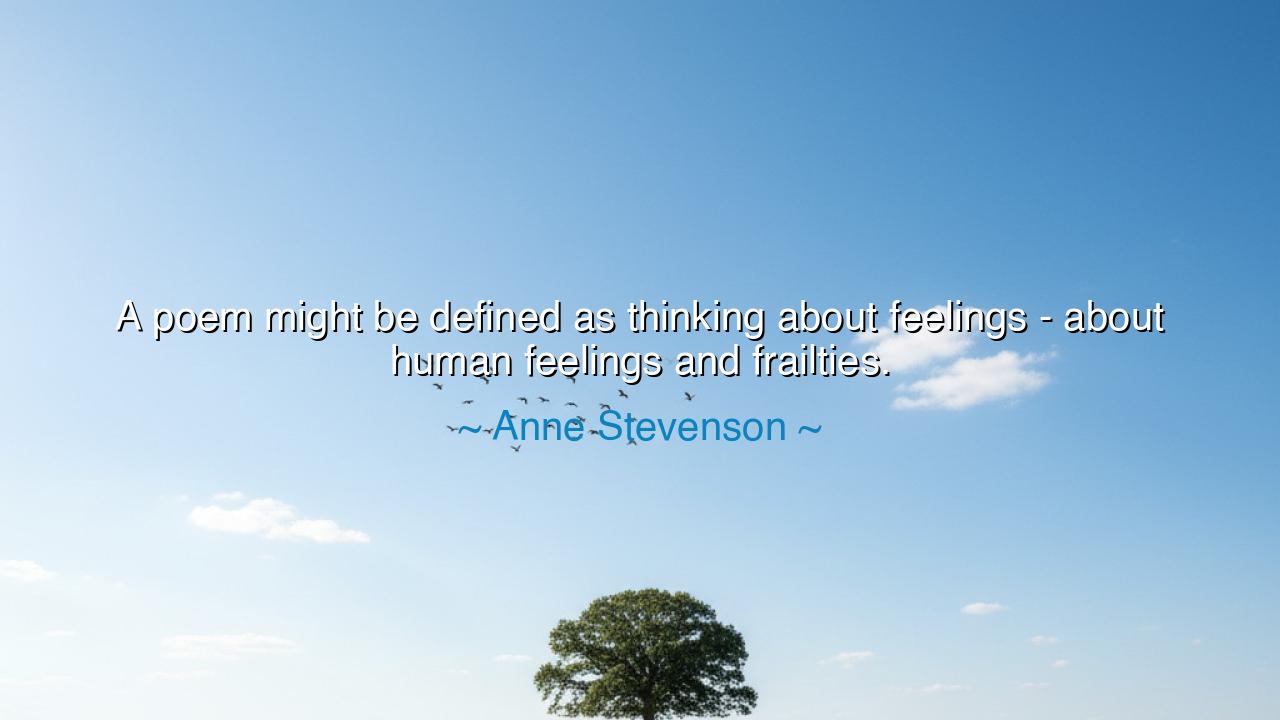
A poem might be defined as thinking about feelings - about human
A poem might be defined as thinking about feelings - about human feelings and frailties.






Hear now the voice of Anne Stevenson, who gave to the world a definition as clear as a bell struck in the stillness: “A poem might be defined as thinking about feelings — about human feelings and frailties.” In this utterance, she reminds us that poetry is not merely ornament of words nor the clever play of rhyme, but the meeting place of thought and emotion, the bridge where mind reflects upon heart. For human beings are not pure reason, nor are they pure passion—we are the union of both, and it is poetry that gives shape to this union.
The feelings she names are not simple joys alone, but the full range of human experience—sorrow, longing, doubt, love, despair, and hope. And the frailties she invokes are the weaknesses and vulnerabilities we often try to hide: our fears of loss, our failures in love, our limits against death and time. Poetry, in Stevenson’s vision, does not flee from these frailties but contemplates them with compassion. It is thinking about feelings—turning them over, studying them, giving them form so that we might understand our humanity more deeply.
The ancients knew this truth well. When Sappho of Lesbos sang of desire, she was not merely expressing passion but reflecting upon its force—thinking about what it means to long, to ache, to burn. When the Psalms of David cried out, “Why have You forsaken me?” they were not only cries of pain but meditations on abandonment, on faith, on the frailty of the human heart before the divine silence. These poems endure because they are not merely emotion, nor merely thought—they are both, fused into song.
Consider, too, the example of Wilfred Owen in the trenches of the First World War. His poems did not simply vent grief or horror; they thought about the feelings of soldiers—their terror, their numbness, their sense of betrayal. His verse transformed private pain into universal witness, giving voice to the frailty of all who endure war. By thinking about feelings, he turned suffering into truth, and truth into beauty that instructs generations. In this way, Stevenson’s words find proof in history: poetry is the mind’s embrace of the heart’s cry.
Yet how often in our own age do we separate the two? Some exalt reason and despise feeling as weakness; others exalt feeling and abandon thought as a burden. But poetry, as Stevenson teaches, shows us that wholeness requires both. To think without feeling is to become cold; to feel without thought is to become lost. Only by weaving the two together can we approach wisdom, and poetry is the loom upon which this weaving is done.
The lesson, then, is for each of us to become poets in our own way—not necessarily with pen and rhyme, but in how we live. When you feel deeply, do not rush past it; pause, reflect, give it thought. When you think clearly, do not cut yourself off from the heart; allow compassion to temper reason. Write your thoughts in a journal, speak them to a trusted friend, or set them to song. In doing so, you practice the art Stevenson defines: thinking about feelings, turning frailty into understanding, and understanding into strength.
Therefore, remember this teaching: a poem is not only for the page, but for the soul. It is the act of reflecting upon your joys and sorrows, your strengths and weaknesses, until they reveal their meaning. To live poetically is to honor your own frailty and the frailty of others, not with scorn, but with tenderness. For in the end, it is not perfection that binds humanity together, but our shared vulnerability—and the poetry that arises when we dare to think upon it.






HTLam Ha thanh
This quote makes me think about how poetry connects with the reader on a deeply emotional level. If poetry is about thinking through human emotions and weaknesses, does that mean it’s inherently therapeutic? How does the act of reading or writing poetry help people process their own emotions? Can poetry be a form of emotional release, or is it more about understanding our vulnerabilities?
NVNguyen Nho Van
Stevenson’s perspective on poetry as a reflection on human frailties challenges the traditional idea of poetry as simply a creative outlet. It makes me question: is poetry always meant to explore the dark, hidden parts of ourselves? Can poetry also serve as a vehicle for healing, or does it always have to confront discomfort and pain?
DTDao Truc
I like the idea that poetry is about exploring human feelings and frailties, but it also leaves me wondering about the role of poetry in dealing with more positive or uplifting emotions. Is poetry only a space for vulnerability and struggle, or can it also celebrate strength, joy, and triumph? Does this definition limit the scope of what poetry can express?
KNNguyen Kim Ngan
I find it interesting that Stevenson describes poetry as thinking about feelings. It suggests that poetry isn’t just about raw emotion but involves reflection and understanding. Does this mean that great poetry has to have a certain level of introspection? Is it possible for poetry to be purely emotional, or must it always carry some sort of reflective thought behind it?
OOtos
This quote made me think about how poetry captures the essence of being human. It’s like the poet takes complex feelings and distills them into something we can all relate to. But is this definition of poetry too narrow? Are there other forms of poetry that transcend feelings and frailties, offering something more philosophical or even abstract? What happens when poetry addresses broader, non-emotional themes?